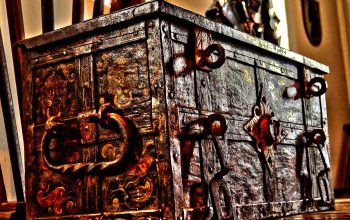Last night I was recounting to Jenn what Adam and Mike had told me about the “overt sexism” they experienced in one of their games this past weekend at Carnage. (Which, at first, I misheard as “avert sexism” and thought it was some kind of weird mechanic built into the game — roll to avert sexism!) Apparently they were playing a game set in ancient Rome, and there was one female player playing the one female character who was a courtesan. Despite the GM informing the group that at this time courtesans were a respectable role with some level of authority, this did not prevent some of the other players from immediately assuming courtesan is a synonym for prostitute, and making “clever remarks” in that direction. And despite the female player’s obvious discomfort, and Adam and Mike’s attempts to move on to other topics, the comments persisted throughout the game.
It’s unfortunate that some RPG players will always jump to the conclusion that roleplaying a character in a time period when sexism was more prevalent that this means it’s OK to be as big of a jerk as possible, and we’ll all enjoy a laugh at their foibles. Roleplaying really does require buy-in and trust on both sides of the table though.
I could ramble on about the need to read your audience and have trust at the gaming table, but that’s not my point here. What I found most interesting was Jenn’s reaction to this anecdote, which was along the lines of “Yeah, if you’re the only girl at the table you should never play the only female character.” It was such an interesting statement I started prodding into other edge cases. What if there were other female characters to choose from but only male players? (Wait to see if some of male players play one of the female characters first.) What if there are other female players but only one female character? (Skip the female character, play a male character.) What I found so surprising here was not necessarily the actual answer, but the fact that Jenn had them so readily at hand. Clearly she had thought this through and had made a set of mental rules.
This is kind of disappointing really. I never think of such stuff when sitting down to play a game. Generally I do prefer to play male characters over female, but only in the same way that say I prefer playing humans to elves and dwarves. I have certainly played my share of female characters at convention games. I suppose this is male privilege for you.
Also, over the years I have become accustomed to Jenn playing male characters at my own games, so much so that it is now ingrained in me to ask any female player if their character is male or female before accidentally using the wrong pronoun. But I don’t do this to my male players, and that kind of sucks. I am really not sure if this means I should try to stop myself from doing this, or do it to everyone, or just continue on as I have been. Is asking this question being open and accommodating for players more likely to be playing a different gender? Am I being insultingly sexist by only asking the girls this question? Would it be overly PC to ask everyone?
And in pondering all that, I realized one of the problems is in the characters themselves. I bring about double the character sheets I need for any game I run at a convention.. This is in part to give players options, partly to allow for the occasional character death, and partly because I use a random generator so it’s really very easy to do so. My random generator in turn uses Chris Pound’s “Silly” fantasy name generator, which I absolutely adore. The names are fantastic. This weekend we saw a dwarf in full plate wielding two magic daggers named “Grisha the Killing Machine”. We also had a hammer wielding fighter named Rodor the Laborer, backed up by Orzaize the Blue Wizard, whose player decided to describe all his spells as being colored in blue in some way, and some discussion was had about his hopes for promotion to Silver Wizard and tenure when he returned to the magic college.
Some players change the names, which I have no problem with, and I even often make the point that they should feel free to do so if they like at the start of the game. Many players though (the good ones in my opinion), will pick a character in part because of the name. All that said, in looking over the names spat out by that generator, I’m noticing a strong lack of female names. In fact, I’d say all the names are either obviously male or ambiguous. There are no clearly female names in the entire thing. And that means that at the table when I turn to a female player and she’s playing “Grimbold Oakshield”, it does not seem unreasonable to ask “is your character male or female?” And perhaps it explains why I’m more likely to do this with a female player than a male player.
OK, so resolutions:
- Find a way to incorporate some obviously female names into my random characters. This may mean having a poke into Chris Pound’s name generator to figure out how it works so I can modify the output, or perhaps simply taking a dump of names from it and then hand-massaging some percent of them to feminize them.
- When starting up a convention game I often go around the table and ask for character name, race, class, level, and AC, just so I can make a quick cheat sheet and not have to ask those questions over and over while playing. Perhaps I should add gender to that list, that way I get it from everyone and just don’t have to think about it later.
I am quite satisfied that resolution #1 there includes digging into some new code. This reinforces what I’ve always found obvious: all problems can be solved with better code. I am the man with the hammer.



Every time I start to think about replying, one of my students comes over with a question! So I give up for now! I’ll just say thanks for posting this!
Sexism: It’s Not Just in Video Games.
I don’t tend to play female characters because I don’t have the vocal range for it, since I am a “funny voices” type of player. (With the exception of Ursula the half-orc barmaid from the Rusty Bucket)
It’s too bad about how it went down at the Carnage game. Not having been there, I don’t doubt some of it to sexism (of the “everything I know about girls I learned from X Men comics” variety, to analyze one set of unfortunate steriotypes with more unfortunate steriotypes.)
I also think there is a type of person out there who seems to conflate edginess (one might even say crassness) with wit, and doesn’t quite understand that making someone uncomfortable isn’t the sort of emotional reaction you should be looking for. A little blue humor goes a long way, but there’s a difference between breaking the ice and dynamiting the lake, to torture a metaphor. This is a group social activity, leave the class clown bullshit back in high school.
Long story short, I think it’s poor socialization rather than any specific animus toward a gender. Treat people like people, respect each other’s comfort level, and most of that crap goes away.
On your other point, you definitely should mix some female names in the randomizer. It gives you more options, either you get a female adventurer or a “Boy Named Sue” situation, and either one’s good. I’d play a mighty barbarian named Petunia in a minute. Don’t matter what gender they might be. 🙂
That’s a good point, BJ, about it likely being poor socialization. That doesn’t, however, make it feel any less like sexism when you’re on the receiving end, as I’ve definitely been at GenCon games, despite playing a male character, but being the only girl at the table. People, of both genders, need to be more aware of what they’re saying when they’re not playing with friends. And it takes a hell of a lot to offend me/weird me out, and I have definitely felt that!
One thing that likely would be helpful for a gal in that situation in the future would be for the GM, Adam, Mike, or any other player who notices she seems uncomfortable to directly and matter-of-factly address the issue instead of trying to steer the conversation somewhere else without being direct. In front of the rest of the table, ask the woman if she’s comfortable with the comments or would rather the topic be given a rest, and be ready to back her up if she wants it to stop. Players could also ask that it be given a rest on their own behalf, or they could ask the woman privately if she’d like them to step in and that if she wants to say something they will back her up. A lot of the problem in these situations is not knowing if anyone feels the same way you do and not knowing if you have backup. You feel like you need to be a “good sport.” It’s a big deal to know some of the guys are also uncomfortable and will help you put uncomfortable joking to rest.
@Jenn:
I think we’re essentially in agreement, and I’m not trying to dismiss anybody’s problems with bad interactions.
I think my point is that sexism is kind of a broad, society in macro issue, whereas one person making another uncomfortable in a social situation is an interpersonal issue and is often better dealt with on that level. Jerks are still people, and usually the root of jerkism is they forget that other people are people too.
In my mind it’s easier to confront behaviors than demographic conflicts. In short, I prefer censuring the crime, not the motive. I think Christine has the right idea. If someone’s being a clownbag at the table, they should be confronted about it and allowed to modify their behavior or summarily booted if they cannot play nicely with others.
This is a good read; thanks for being so thoughtful about this stuff. It makes me wonder if I’ve been remiss in playing female characters a certain way and reinforcing gender tropes. While it amuses me to play a flirty character, it’s not worth giving other players the idea that all women will be fine with risque banter. I agree with BJ also–a lot of this comes down to social cues.
Some great comments here, I’m glad to have written something a little thought provoking. As it pertains to the original experience of Mike and Adam, I would say that I wasn’t actually there and as my report is second-hand it’s hard for me to comment on it. A direct calling-out as Christine suggests sounds pretty reasonable to me, but if the culprits don’t respond as desired I do think part of convention play is putting on your blinders to all manner of socially deficient table-mates. That many random people gathered together will inevitably bring you into contact with someone you’d never play an RPG with given the choice, but I think a good time can still be had without bringing it to the point of a shouting match. Again though I don’t really know the severity of their behavior, so I can’t really say how reasonable it was to turn the other cheek.
I reported their experience mainly to illustrate it as the catalyst for my own thought process into what I found to be the more insidious sexist behavior I was myself perpetrating without even realizing it. Here I thought I was being nice to the girls not assuming which gender they were playing, but of course is not treating someone differently based on their gender the very definition of sexism? I am glad to have caught myself out on this, and would be very curious to hear from others if they think my two resolutions are a sufficient correction.
@B.J. Johnson (BigFella):
@BJ – yes! I do agree, but I was just continuing the thought. I agree that Christine is onto something about directly bringing up the issue!
@Shannon – and I think it really depends on who you’re playing with! Early in college I played a female character who was pretty ended up married to another character, w/ all the associated jokes from everyone. And that was fine – I was playing w/ friends! Would I play a super-girly flirty female character at a con? Likely not! Which sucks, because some females ARE super girly and flirty, some or all of the time. Being afraid to play that for fear of reactions and perpetuating stereotypes is limiting.
@Paul:
To be honest I think your definition of sexism needs a bit more nuance. I’d put it more into “treating someone as inferior because of their gender” or “assuming the worst about someone because of their gender”.
Like it or not, gender is one of the factors humans must use to “read” each other and guide their interactions. Everybody has different manners or behaviors for different people. You talk to me differently than you talk to your grandma. (I assume. Who knows, maybe your grandma’s down with ska music and Gozilla movies.) With the people you know those behaviors are tailored based on experience and time, but with strangers you generally need to start with assumptions before you can build that familiarity. Behaviors that set off the sexism meter generally start from flawed or incomplete assumptions, or at their worst assumptions that don’t change when they’re proven inaccurate.
But I think the other side of the coin is thinking that because those assumptions are sometimes flawed they should be dispensed with, which kind of puts a lot of unneeded pressure on social interactions between strangers. It’s difficult to the point of nonsensicality to expect someone you just met to have that sort of finely tuned idea of how to treat you. And allowances must be made for learning. Everybody needs to have a bit of forgiveness in them. To tie it to your post I think you don’t need to worry too hard about ascertaining character vs. player gender. People tend to base their characterization on what they see in the mirror, so it’s not really that bad a baseline to work from. It’s a matter of seconds to correct a wrong assumption, and frankly oughtn’t be that grave a slight.
I write this because I think my last post about “confronting and or ejecting” someone for being a jerk is a bit combative, and I think it ties with my discomfort in using a society size term like “sexism” for individual bad behavior. Unless someone is so emotionally immature that all criticism is an assault on their being, asking someone to knock off the bawdy jokes generally leads to a positive modification of behavior. Good sportsmanship, and I think by extension good gamesmanship, means if you knock somebody over, you help ’em up, shake hands, and keep playing.
My OD&D NPC generators created named NPCs with a distribution of 50% feminine, 49% masculine, 1% other. (Unfortunately, my source datasets did not have sufficient non-binary names to create a distinct name generator for non-binary characters, so they randomly draw from either name generator. Since most of the names are effectively original I doubt it would often be noticed anyway.)
They are available free on my website at http://mrjoshbear.net/odd-referee.html and I would be happy to license the code and name lists under any free scheme you would care to specify if you would like to use it as a starting point.
Thanks for the offer Joshua! I’ve actually been in touch with Chris Pound though and already have something cooking. Will post about that soon.